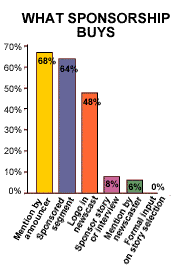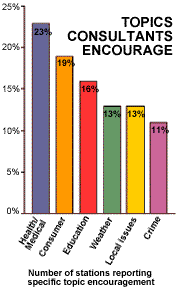By Marion Just and Rosalind Levine, with Kathleen Regan
How much is your local TV news influenced by the people who buy ads?
In a survey of 118 news directors around the country, more than half, 53 percent, reported that advertisers pressure them to kill negative stories or run positive ones.
And many of these news directors say the problem won't go away. "Sales is getting more and more influence on newscasts," said a news director from one medium-sized market. "Sponsorships, coverage suggestions, on-air mentions."
The pressure to do puff pieces about sponsors occurs "constantly," "all the time," "everyday," "routinely," and "every time a sales person opened his/her mouth," news directors reported in a major survey of local news stations.
It is "getting harder every year" to maintain the wall between sales and news, reported another news manager.
These are some of the findings of the survey of 118 news directors around the country, conducted between June and August 2001. The sample represents a significant proportion of the approximately 850 stations that broadcast news. The answers have a margin of error of plus or minus 5 percentage points. News directors in all but two cases wanted their comments to be anonymous for fear of retaliation for criticizing their companies.
News directors also reported their TV consultants (outside companies hired by stations to critique newscasts and improve ratings) issuing blanket edicts about what to cover and what not to cover in order to attract the most advertising dollars.
Together, the findings and comments raise questions about the journalistic independence of local television news.
The number of stations that indicate sponsor pressure this year confirms a problem we first saw in our 2000 study. Last year a third of the news directors in a limited sample of 20 stations reported advertisers trying to influence what gets on their broadcasts. Although that sample was small, when coupled with the comments by news directors, the evidence suggests the problem is getting larger.
Breaking down the sponsor suggestions more specifically, 47 percent of news directors this year said sponsors tried to get them to provide favorable coverage.
And 18 percent of news directors – almost one in five – say sponsors try to prevent them from covering stories, a problem that is more acute in smaller markets. "Interference is common," one news director told us.
When it comes to advertisers trying to compel positive stories about themselves, 16 percent of stations said that they had been asked to cover sponsor events. Another 8 percent covered events that were partnerships between the station and the advertisers; 12 percent said the sales or advertising staff requested positive coverage of sponsors.
Some news directors take a benign view of sponsor pressure. As one put it, if the story has "a valid 'news' angle," they will cover it whatever the source. "Advertisers have the same right to pitch their stories to the news department as anyone," said another news director.
At most stations, however, news directors admit that advertisers get something more than just commercial time for their money. In over two-thirds of stations, for instance, news sponsors are named by the announcer or identified with a particular news segment.

At about half the stations surveyed, the sponsor logo appears in the newscast. None of the stations in our sample reported that sponsors were allowed involvement in story selection, but a handful of stations gave sponsors interviews or mention in the body of a newscast in exchange for their support.
A news director in a large market said the biggest change in the newsroom this year was "pressure from sales because of the economy."
More alarming is the idea of sponsors discouraging stories or even getting them killed.
A half a dozen news directors singled out local car dealerships and auto manufacturers as the focus of squashed stories. "We don't aggressively go after car dealers," one news director admitted. Another reported a "negative story on an auto dealer canned under pressure from client."
News directors also mentioned health investigations at local restaurants as vulnerable. At two stations, for instance, stories were killed when they reflected poorly on restaurant sponsors. Two other news directors said grocery stores tried to get them to drop investigative stories.
Another news director described how pressure came from within the station (the sales department) and without (the local restaurant association) but "news prevailed."
In fact, a number of news directors felt able to withstand interference from "sales reps who don't understand the business." Some volunteered that they were supported by their general managers so that "the sole and final decision is with the news department."
One news director commented that he received "zero pressure from the general manager," and another reported that even in the face of loss of sponsorship, management "always backed up the news department."
What emerged was the sense that the relentless push by advertisers and sales departments inevitably yields small concessions from beleaguered news directors. Even without overt pressure news directors may feel obliged to compromise just to keep their jobs.
Small Markets, Big Pressure
The problem of sponsor interference in our sample was more acute in medium-sized and small markets. In one case, "Sales sold sponsorship to [a] local retail group, which required 'positive' stories on retailers (i.e. thinly veiled commercials)."
Another news director complained that "[the] sales department books our live trucks for live sales remotes, which air in commercial breaks within certain newscasts." One live truck out of service, one less opportunity to cover breaking news. And commercials that look like news thrown in for good measure.
While only a third of news directors in the very largest markets reported sponsor pressure to provide positive coverage, fully two-thirds of news directors in the smallest markets feel those pressures.
A quarter of news directors in small markets, those under 376,000 households, report that they have been pressured to censor their news. One news director in the Rockies described the situation as "a very large problem in this market."
Pressure on newsrooms is aggravated by the fact that small stations cannot afford their own lawyers. As a result they try to avoid stories that might prompt legal action.
One news director described an incident where the station "obtained copy of a Department of Human Services report on abused foster child. State law holds it 'confidential.' We would have been hauled to court if used [report] and refused to reveal source. Source broke the law by handing it to us." This small station did not feel it could cover the story.
Other small-market stations also reported staying away from stories that dealt with social service agencies in their states or cities. Several news directors avoided stories where a libel suit was threatened or even where "one individual was named" in a negative way.
Consultants
Pressure on news content comes not only from outside the newsroom, but also from those who are invited in – the ubiquitous news consultants. Most stations use independent consultants.
About half the stations surveyed use outside consultants periodically or for special topics and 21 percent solely rely on consultants drawn from their parent company. About two-thirds of the stations in our survey report that consultants visit their stations two to four times a year.
What kind of advice do these consultants have to offer? A common complaint is that consultant recommendations are not tailored to the needs of individual stations. More than half of the stations report that the advice they receive is "mostly" or "entirely" general, usually focusing on presentation rather than content.

Not surprisingly, the maxim "you get what you pay for" holds true for consultants. While 59 percent of stations in large or very large markets get advice made to fit their particular situation, only a third of small-market stations have access to that kind of consultation.
News directors are not overcome with enthusiasm about consultants, but most tell us that consultant advice is at least somewhat useful. Consultants played a role in a wide range of activities, everything from developing a station's news "philosophy" to recruiting and coaching on-air personnel.
More than half of stations (52 percent) say their consultants actively push covering certain kinds of news. When they did so, they tended to tout "soft news" – health and consumer issues.
Nineteen percent of stations reported their consultants did something we consider even more worrisome, discouraging covering certain kinds of news.
News directors told us that sports was the topic consultants most often discouraged, but they said that politics and local business coverage had also been singled out.
Consultant advice to give more time to health and less to sports seems pitched to make local news more attractive to female viewers.
News directors are more positive about advice from general managers than the kind they get from consultants. They rarely see managers as "interfering." Several GM's mentioned in our survey were former news directors. Others commanded respect because of their experience and expert knowledge of the news.
A number of news directors said general managers suggested story ideas "like everyone else." But of course, as one news director remarked, "They are not everyone else."
Increasingly, it seems, advertisers aren't either.
Marion Just is a professor of political science at Wellesley College and a research associate at the Shorenstein Center on the Press, Politics, and Public Policy at Harvard. Rosalind Levine is an attorney in Boston. Kathleen Regan is a student and research assistant at Wellesley.


